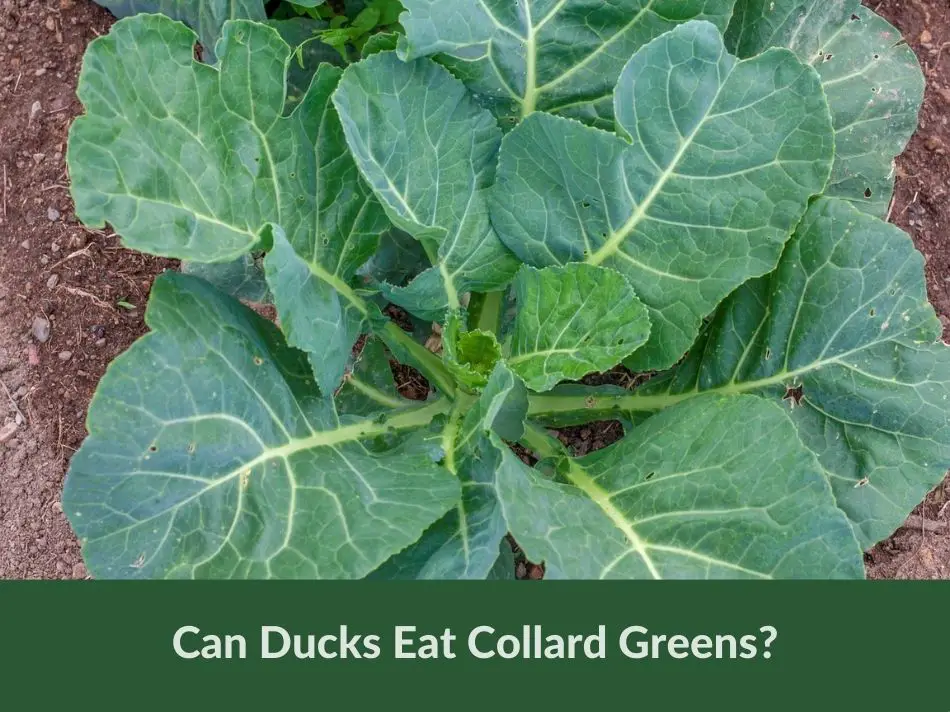Ducks are omnivorous creatures, which means they have a varied diet that includes both plants and animals. In the wild, they’ll often consume aquatic plants, small fish, insects, and even crustaceans. Domesticated ducks, on the other hand, are often fed a balanced pellet diet, but they also enjoy a variety of vegetables and fruits as treats. But, can ducks eat collard greens?
Yes, ducks can eat collard greens. Leafy greens like collards can be a nutritious addition to their diet. Always feed in moderation and never replace and entire meal with collard greens.
In this article, we delve into the dietary habits of ducks, specifically focusing on the suitability of collard greens in their diet. From understanding the general eating patterns of ducks to the health benefits and feeding methods of collard greens, we provide comprehensive insights for both caretakers and park visitors
How Often Can I Feed My Ducks Collard Greens?
Collard greens can be fed to ducks a few times a week. It’s essential to ensure that the greens are fresh and free from pesticides. Remember, while collard greens are nutritious, they shouldn’t replace the primary diet of ducks.
Can Ducklings Eat Collard Greens?
Ducklings have a slightly different dietary requirement than mature ducks. While it’s safe to introduce collard greens to ducklings, it should be done sparingly and only after they are a few weeks old. Ensure the greens are finely chopped to prevent choking hazards.
Collard Greens Nutritional Value
Below is the nutritional value of 100 grams of collard greens.
- Calories: 32
- Protein: 3.02 g
- Total Fat: 0.61 g
- Carbohydrates: 7.39 g
- Fiber: 3.6 g
It also contains several vitamins and minerals as listed below.
- Vitamin K
- Calcium
- Vitamin C
- Folate
- Vitamin A
- Magnesium
- Potassium
- Phosphorus
Are Collard Greens Healthy for Ducks?
Ducks, like many animals, require a balanced diet to maintain optimal health and productivity. Collard greens are healthy for ducks and below are some amazing benefits:
- Vitamin K plays a crucial role in blood clotting, ensuring that wounds heal properly.
- Calcium is essential for strong bone formation, especially in laying ducks, where it’s vital for eggshell production.
- Vitamin C aids in collagen synthesis and can help in reducing stress, especially important for ducks in variable weather conditions or those exposed to potential stressors.
- Folate is key for DNA synthesis and cell division, supporting growth and overall health.
- Vitamin A is vital for vision, growth, and immune function, ensuring ducks can see well in low light and remain resistant to diseases.
- Magnesium plays a role in numerous biochemical reactions in the body, including energy production and muscle function.
- Potassium helps in maintaining proper muscle function and nerve transmission, ensuring ducks remain agile and responsive.
- Lastly, Phosphorus works in tandem with calcium for bone health and also plays a role in energy metabolism.
Incorporating these vitamins and minerals into a duck’s diet ensures they remain healthy, active, and productive throughout their lifespan.
How To Feed Collard Greens To Ducks
- Wash the Greens: Always ensure they are clean and free from pesticides.
- Chop Them Up: Especially for ducklings, but even for adult ducks, it’s easier for them to consume if the leaves are chopped into smaller pieces.
- Serve Raw: There’s no need to cook the collard greens. Ducks enjoy them raw and fresh.
- Provide Water: This is crucial. Always ensure ducks have access to clean water, especially when feeding them. They need it to help swallow and digest food.
More Vegetables Ducks Can Eat
Offering ducks vegetables can be a delightful change from their regular meals. While collard greens are a favorite, there are several other vegetables that ducks can safely consume.
Each of these vegetables offers unique nutritional benefits, and with moderation, they can be a healthy addition to a duck’s diet. Always ensure they’re fresh and free from pesticides before serving.
Conclusion
Collard greens can be a delightful treat for ducks, offering both nutrition and a change from their regular diet. Caretakers and even park visitors might be tempted to feed ducks, but it’s essential to know what’s safe and what’s not.
While it’s a kind gesture to feed ducks, always ensure that the food is appropriate for them. Feeding ducks can be a rewarding experience, connecting us with nature and these charming creatures. Let’s ensure we do it responsibly and in the best interest of our feathered friends.
Disclaimer: The information in this article is for informational purposes only. I'm not an expert or a veterinarian.


